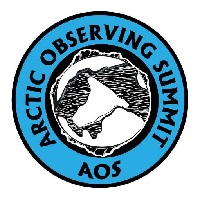Arctic Observing Summit 2024
 The Arctic Observing Summit (AOS) 2024 will be held as part of the ASSW 2024 from 27 - 29 March 2024. The AOS is a biennial summit that serves as a platform for communication within the Arctic observing community. It brings together perspectives from across national and operational/research boundaries, and centers Indigenous priorities in the conversation. Working groups at the summit link regional Arctic observing efforts into global observing systems, provide community input into SAON initiatives, connect the broader observing community with data system efforts, and highlight areas of pressing need within the observing community. The AOS facilitates these conversations through a short statement and white paper process, and plenary and breakout sessions at the summit. Recommendations generated at the summit inform decisions from the project level to the Arctic Science Ministerial. Through the AOS, the Arctic observing community works together to build a more resilient, efficient, and equitable observing system. The AOS has been a hybrid meeting since 2022.
The Arctic Observing Summit (AOS) 2024 will be held as part of the ASSW 2024 from 27 - 29 March 2024. The AOS is a biennial summit that serves as a platform for communication within the Arctic observing community. It brings together perspectives from across national and operational/research boundaries, and centers Indigenous priorities in the conversation. Working groups at the summit link regional Arctic observing efforts into global observing systems, provide community input into SAON initiatives, connect the broader observing community with data system efforts, and highlight areas of pressing need within the observing community. The AOS facilitates these conversations through a short statement and white paper process, and plenary and breakout sessions at the summit. Recommendations generated at the summit inform decisions from the project level to the Arctic Science Ministerial. Through the AOS, the Arctic observing community works together to build a more resilient, efficient, and equitable observing system. The AOS has been a hybrid meeting since 2022.
More information will be made available by the AOS 2024 Organising Committee in the coming months on the AOS 2024 website:
Visit the Arctic Observing Summit 2024 Website and Program
About the AOS: The AOS fosters communication, international collaboration and coordination of long-term observations aimed at improving understanding of and response to system-scale Arctic change. The AOS is an international forum for optimizing resource allocation, and minimizing gaps and duplication, through coordination of and exchange among researchers, agencies, Indigenous Peoples, non-governmental organizations, the private sector and others involved or interested in long-term observing activities. The AOS serves as a platform to identify and address societal and scientific needs and priorities, minimize gaps in data and information, reduce duplication, improve coverage and breadth, and contribute to solution-based applications and knowledge sharing. Rapid and unprecedented system-scale environmental change in polar regions, and other sensitive areas globally, requires adaptation, forecasting, planning and the development of mitigation strategies, all dependent on a timely, accurate, and integrated network of Arctic observing systems. The AOS provides opportunities to make tangible contributions and progress towards the development and operation of such a system of systems spanning all Arctic components, and including consideration of community needs, international cooperation, opportunities, and challenges, and from decision-makers to community members.
